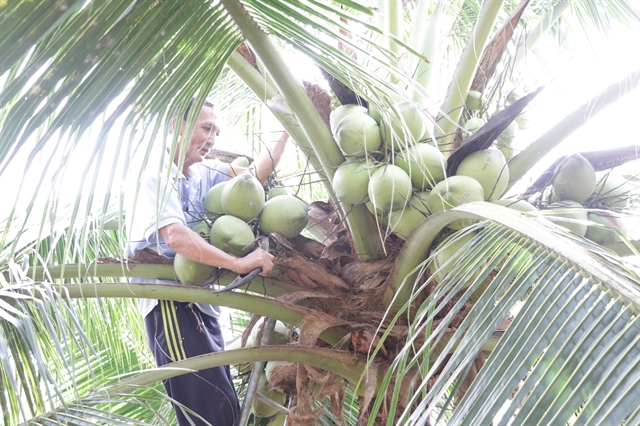 Society
Society


|
| Harvesting xiêm xanh coconut for juice in Bến Tre Province’s Giồng Trôm. — VNA/VNS Photo Công Trí |
BẾN TRE — Climate change has affected crop yields in the country but coconut can adapt and offer high value to farmers, experts have said.
The area under coconut is the fourth largest of industrial crops after rubber, coffee and cashew, with most of it being in the Cửu Long (Mekong) Delta and central region.
The Mekong province of Bến Tre has more than 71,000ha, or 50 per cent of the country’s total area, according to its People’s Committee.
Trà Vinh, Tiền Giang and Vĩnh Long are the other large coconut growing areas in the delta.
Speaking at a seminar on Sunday (November 17), Cao Văn Trọng, chairman of the Bến Tre People’s Committee, said the province’s exports of coconut products are worth around US$200 million a year and a quarter of all its exports.
However, coconut has not been developed to its full potential to boost Bến Tre’s socio-economic development, he said.
Most coconut groves in Bến Tre are small and scattered, and farmers do not tend optimally, he added.
Lê Thanh Tùng, deputy head of the Ministry of Agriculture and Rural Development’s plant cultivation department, said Bến Tre should zone its coconut growing areas to establish concentrated growing areas and factory clusters that process coconut products.
It should help coconut farmers set up co-operatives, sign contracts with processors and exchange information among themselves, he said.
Coconut farmers should adopt the intensive farming method and intercrop coconut with cacao, banana, orange, and grapefruit to improve incomes, he said.
They should adopt good agricultural practices (GAP) standards and advanced farming techniques to improve quality, he said.
Coconut can cope with climate change well since it can adapt to water salinity of 0.5 – 0.6 per cent, poor soil, rains, storms, flooding, and drought, according to the Southern Horticultural Research Institute.
Phạm Văn Duy, deputy head of the ministry’s processing department, said farmers should choose high-quality and high-yield varieties to meet local and global demand.
The country exports a number of coconut products such as oil, candy, dried copra, juice, handicrafts made from the shell to many countries.
In the first nine months of this year, they were worth $109.1 million, according to the General Department of Việt Nam Customs. — VNS




